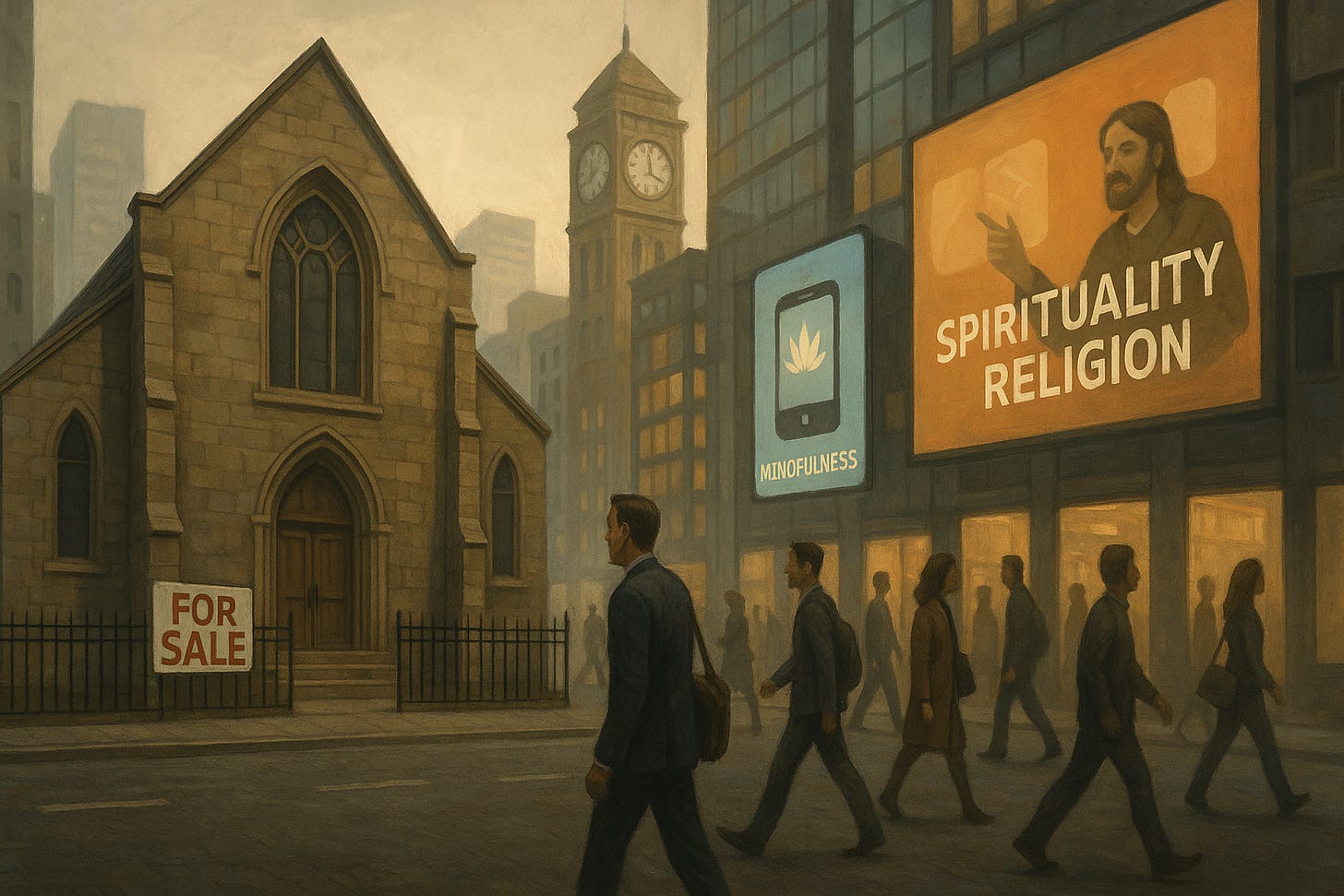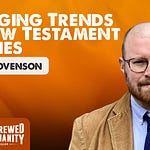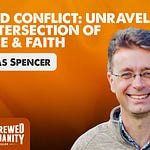The Paradox of Liberal Theology
From the earliest days of the podcast, I have chronicled the ebbs and flows of American religious life, particularly within the mainline Protestant traditions. Throughout these decades, a puzzling contradiction has persisted: as liberal Christian institutions decline, liberal theological production flourishes. The seminaries may empty, but the presses run hot with volumes of thoughtful, creative theological work. This paradox begs our central question: Does liberal Christianity have a future?
What we face is not merely a messaging problem or institutional mismanagement, but what my friend Bo Sanders aptly names a "perfect storm" — a fundamental incompatibility between liberalism's prioritization of the individual, Christianity's commitment to community, and the corrosive effects of consumer capitalism on both. The evidence of trouble is clear: declining membership, aging congregations, and diminishing cultural influence. Yet many observers dream for renewal. Let us examine the elements of this perfect storm to understand what is at stake.
The Historical Context: Liberal Theology's Mediating Role
From its inception, liberal theology positioned itself as what Dorrien calls "a third way between orthodox overbelief and secular disbelief." When Schleiermacher wrote to religion's "cultured despisers," he began a project that would define liberal theology's vocation: making Christianity credible to modern consciousness while preserving its spiritual essence. This mediating strategy succeeded marvelously — for a time.
Liberal theologians "struggled to ward off" secularization while accepting modern intellectual culture's judgment against mythical consciousness. By adopting secular thought forms, they sought to salvage what they considered Christianity's enduring truths. The great social gospel theologians like Walter Rauschenbusch "saved Christianity by harmonizing it with science and modern society," as Bernard Meland noted, but "they did not make Christian thinking integral with modern thought." The two sources remained in tension.
This approach worked when Christianity still dominated culture and its basic framework was widely understood, even by critics. But what happens when religious consciousness itself becomes a minority option? When Christian symbols no longer resonate in the broader culture? When the institutional forms of religious life grow culturally obsolete? Here lies the root of our current crisis.
TRIPP’S BIRTHDAY DISCOUNT: Get Premium Access to the “Process This” Substack with Tripp Fuller for 20% off if you sign up before June 11th!
The Intellectual Vitality Paradox
As Gary Dorrien astutely asks, "If liberal theology is self-liquidating, why is there so much of it?" The scholarly output remains impressive. "For creativity, breadth, depth, scale, and insight, the constructive and programmatic works" of contemporary liberal theologians "compare favorably to those of any major theologians of any generation." Until recently, popular authors like Marcus Borg and John Shelby Spong reached substantial audiences. The intellectual apparatus remains sturdy should one care.
Yet this vigor exists alongside institutional decline, creating what Catherine Keller calls liberal theology's "double bind." To the extent theologians "work on the cutting edge of their discipline, they lose their traditional constituencies in religious communities." Conversely, when "they write in and for religious communities, they are sucked into 'the dogmatic drag, the vortex of swirling symbols and insecure institutions.'"
Steven Webb captures this predicament with elegant precision: "Liberal theology is too secular for religious believers, too religious for secularists, and too academic for non-theologians." In attempting to speak to everyone, liberal theology finds itself speaking effectively to almost no one. Its very mediating function has become its greatest liability.
It is worth noting here the oddity of the phrase Liberal Mainline Protestantism. Despite the efforts of the denominations, theologians, and clergy, the people in the pews are hardly liberal, with 55% voting for Donald Trump in the last election. Only the Episcopal and UCC denominations had a small majority of members vote for Harris. Given the precipitous decline and aging of mainline churches, they grow increasingly marginal to culture at large. Ideologically, they have on a whole, lost much of the protest in their protestantism, with members being significantly more moderate culturally than the leadership.
The Five Predicaments of Liberal Theology
Beyond this strategic dilemma, liberal theology faces five substantive predicaments that compound its troubles.
First, what Henry Nelson Wieman identified decades ago as "spiritual thinness" — liberal theology "shrank from defending God's existence and tried to make itself attractive by appealing to social concerns." This strategy became "a loser," as Wieman bluntly put it, driving "strong and intelligent people away from religion." Without robust God-language, churches offer little that secular progressivism doesn't already provide. Given the moderating trajectory of Mainline Protestants at a congregational level, one wonders if there’s even much concern for social change and not more aptly, a Morning Joe style mournfulness for a time they had a voice that solicited much more than apathetic eyerolls.
Second, the loss of mythic consciousness. Bernard Meland argued that liberal theology "whittled down the Christian myth to fragments of the Christian ethos," creating spiritual impoverishment that "was killing liberal Christianity—a tragedy for Western culture." By straining out the paradoxes and mysteries of faith, liberals lost the very elements that give religion its power. When the anti-intellectual perversion of fundamentalist evangelicalism is treated as normative, Protestants develop an allergy to an encounter with the Word. They end up guarding themselves against divine address by garbing themselves in an epistemological distancing maneuver that counts a buffered soul as a wise one.
Third, the "double bind" problem mentioned earlier, which leaves theologians caught between academic credibility and religious relevance, unable to fully satisfy either constituency. In an odd way, if liberal theology is too secular for religious believers, too religious for secularists, and too academic for non theologians, they may have managed to reach all their potential audience. That’s a problem.
Fourth, what I call "liberal laryngitis" — the inability to speak clearly on both large and small issues. When every statement must be qualified, when no truth claim can stand without hedging, proclamation becomes impossible. Too often the preacher must apologize for the text, and fails to have a strong take on the Gospel.
Fifth, the nostalgia trap. Today's liberals celebrate past victories while remaining hesitant on contemporary moral challenges. They rightfully honor their prophetic stands on race and gender but struggle to apply the same prophetic energy to present controversies. They live on the fumes of yesterday's courage. God may still be speaking, but if we walk into the future facing backwards, we can’t expect to hear, see, and step with confidence.
The Cultural Shift: Beyond Theology's Control
Even if liberal theology could address its internal contradictions, broader cultural shifts have undermined its foundations. Christian Smith's "horse and buggy" analogy is apt — liberal Christianity hasn't been rejected so much as bypassed by cultural evolution. People didn't decide horses were morally inferior to automobiles; they simply found cars more practical for modern life.
Consider what historian Bill Leonard calls "the sociology of Sundays" — the transformation of America's weekend patterns. When Sunday becomes just another day for shopping, sports, and work, church attendance becomes one option among many rather than a community standard. Add to this the gig economy, frequent relocations for careers, delayed marriage and homeownership, and you create a society where a stable religious community becomes increasingly difficult to maintain. Oddly enough, this leads to a time like ours where a college degree, children, and homeownership increases the likelihood of regular participation in a community of faith.
The philosopher Byung-Chul Han describes our crisis of ritualization and narration"— the disappearance of shared symbolic frameworks that give meaning to time and space. In traditional societies, religious myth provided a unifying narrative, and rituals embedded individuals in this larger story. Today's fragmented, individualized spirituality lacks this cohesive power. When Han observes that liberal "patchwork religion emerges from the decay of a unified horizon of meaning," he names precisely what makes contemporary liberal Christianity so thin.
Furthermore, authority has shifted from institutions to influencers. People no longer trust churches simply because they are churches, denominations because they were baptized there, nor pastors simply because they hold credentials. In this environment, liberal Christianity's institutional heritage can become a liability rather than an asset.
The Perfect Storm: The Fundamental Incompatibility
These elements converge in the perfect storm — a fundamental incompatibility between liberalism, Christianity, and consumer capitalism. Liberalism inherently prioritizes individual autonomy and choice, while Christianity fundamentally calls for communal formation and shared practice. Consumer capitalism exacerbates this tension by training us to approach everything, including religion, as discerning customers seeking personal satisfaction.
When Bo and I discussed this on the Theology Nerd Throwdown I found his eardrum and elevator analogy particularly illuminating. Just as human eardrums physiologically limit how fast elevators can descend (creating pain at speeds above 30-40 feet per second), there may be built-in limitations to how individualistic a communal religion can become before it ceases to function. Like engineers who can design faster elevators but cannot redesign human eardrums, liberal theologians can create more individualistic theology but cannot overcome the communal nature of Christian formation.
This creates what Bo describes as the "important but not urgent" dynamic. Liberal clergy present spirituality as important but not urgent, but their parishioners often receive it as neither important nor urgent. Without the strong communal expectations found in more conservative traditions, liberal religion struggles to maintain the consistent participation necessary for particular spiritual formation.
Case Studies in Contradiction
These contradictions manifest in countless everyday church situations. Consider the wedding/baptism paradox — couples seek religious ceremonies but have no intention of joining the community that gives these rituals meaning. Ministers accommodate by using more generic spiritual language, but this very accommodation undermines the distinctiveness that might draw people into deeper commitment.
Similarly, community meals designed to serve the hungry intentionally avoid prayer or religious content to be "welcoming," yet this approach creates no pathway for recipients to enter the community behind the service. The church thus becomes a service provider rather than a formative community.
Bo and I both bemoaned the problem of organ endowments. We both worked at churches whose endowments specifically designated for pipe organs and stained glass windows exceeded their entire mission budgets. These institutions maintain beautiful buildings but struggle to articulate why anyone should gather in them.
The educational focus over worshipful formation represents another contradiction. Liberal churches often delay children's participation in worship until they've been educated about it, forgetting that worship itself is education. By prioritizing cognitive understanding over embodied practice, they inadvertently teach that Christianity is primarily about ideas rather than transformation – something no one would truly claim and yet it shapes our practice. When kids born into the congregation move from the nursery to Sunday School to youth group and confirmation before ever finding themselves in the worshipping body, we can’t be surprised when they follow our lead and continue to take communal worship as optional.
The Stakes of the Crisis
Liberal Christianity faces not merely marketing issues but fundamental structural challenges that threaten its continued existence. Yet something valuable would be lost with its disappearance. Liberal theology at its best preserves the possibility of a thoughtful faith that engages modern knowledge while cultivating spiritual depth.
In a polarized culture, the mediating voice of liberal Christianity offers an alternative to fundamentalisms both religious and secular. Its commitment to holding faith and inquiry together, tradition and innovation, transcendence and immanence, represents a distinctive and valuable contribution to public discourse.
Whether liberal Christianity's future involves institutional renewal or transformation into something that transcends the present dead end remains uncertain. What is clear is that continuing on the current path leads only to further decline. The perfect storm shows no signs of abating. The question is whether liberal Christians can build an ark sturdy enough to weather it.
Perhaps, the Ark of liberal protestantism has run aground and we need to take advice from Alfred North Whitehead who said, “A system of dogmas may be the ark within which the Church floats safely down the flood-tide of history. But the Church will perish unless it opens its window and lets out the dove to search for an olive branch. Sometimes even it will do well to disembark on Mount Ararat and build a new altar to the divine Spirit, an altar neither in Mount Gerizim nor yet Jerusalem.”
Here, Reinhold Niebuhr's perspective offers the most helpful frame: Christianity always stands under judgment, including its liberal expressions. The task is not preservation for its own sake but faithful witness to transcendent truth in changing times. In that light, liberal Christianity's crisis may be precisely the crucible needed to forge a more vital faith for the future.
Related Resources
Christian Smith’s Why Religion Went Obsolete and Gary Dorrien’s The Spirit of American Liberal Theology, Crisis and Necessity of Liberal Theology, & In a Post-Hegelian Spirit
Podcasts: Christian Smith: Why Religion Went Obsolete, Bill Leonard: the Fundamentalization of American Religion, Does Liberal Christianity have a Future?, and A More Hopeful Future for Liberal Faith.





















Share this post